- Home
- Claire Lazebnik
Epic Fail Page 3
Epic Fail Read online
Page 3
“Great.” Chase rose to his feet. “Romano’s is on the southwest corner of San Vicente and Montana. But maybe I’ll see you before then. What classes do you have after lunch?”
Juliana thought a moment. “Uh . . . math. And then English. And then Visual Arts One.”
“Who for English?”
“Feinberg.”
“Me too!” His delight seemed genuine. “Save me a seat if you get there first.” He swung his leg over the bench. “Bye, Elise. Nice to meet you.”
“Same here,” I said.
“Later,” said Derek Edwards without looking at either me or Jules. He grabbed his lunch silo and left the table without another word. Chase followed after him with one last cheery wave.
“Are we really going to go out for pizza with them?” I asked Jules as we picked up our trays and carried them to the trash cans.
“I’m not sure we should.” Her brow was creasing the way it did when she was uneasy. She added her tray to the stack on top of the trash can. “He probably felt like he had to invite us since we were sitting right there.”
I emptied my tray in the trash and put it on top of hers. “I think he really wanted you to go. But he probably was just being polite about the rest of us.”
“I don’t want to go alone. So either we all go or none of us.”
“Derek looked kind of annoyed when Chase said to bring everyone.”
“I think that’s just the way he always looks.” Jules grinned wickedly at me. “But we shouldn’t judge—maybe the poor guy has a rash in an awkward place.”
I laughed. “That would explain why he’s so irritable.” We started walking back toward the building. “Especially about his parents—he acted like no one had the right to talk about them.”
“Yeah, I noticed that, too.” A beat. “Chase is nice, though, isn’t he?”
I nodded and sneaked a glance at her. Yep. All starry-eyed and hopeful and excited, just like she sounded.
I watched her head off toward her next class with a slightly anxious feeling in my throat. Chase did seem nice. But this school—this city—was like nothing we’d known before, and I had a feeling that someone like Juliana could get chewed up and spat out in a second.
I’d just have to look out for her, that was all. I always had and I always would.
Chapter Three
Gifford turned out to be in my Honors French class. To my surprise she actually came over and swung her slender body into the chair next to mine.
“Can you believe Chelsea?” she said by way of a greeting. “I mean, that whole Romano’s thing? Like she has time to have pizza if I’m not there, but not if I am?” She leaned her head close to mine and lowered her voice. “I know why. She totally has a crush on Derek and doesn’t want any competition.” She rolled her eyes. “But hello-o! Everyone knows he only hangs out with her because he’s been friends with her brother since, like, preschool. It has nothing to do with her.” She snaked her phone out of her purse and, hiding it on her lap below the desk, stole a glance at it. “I texted her about it, but she’s deliberately ignoring me. I know she keeps her phone on vibrate during class.”
“You can come with us, if you want,” I said.
“To Romano’s? What do you mean? Did Chelsea invite you?”
“Chase did.”
“Why?” Maybe not the most tactful question, but it was clear she was just surprised, not trying to be rude.
“I don’t know. He was being nice, I guess. We have room in the car if you want to come.”
“God, Chelsea will be so pissed if I just show up!” She seemed delighted at the thought. “I can’t wait to see the expression on her face! Let me just text my mom.” She tapped quickly before putting the phone away because class was starting, but when she checked at the end of the hour, her mother had reminded her that the tennis coach was coming that afternoon. (“Coming”—that meant she took lessons at her house. That meant she had a tennis court in her backyard. My family barely had a backyard in our backyard.) As we picked up our books, a disappointed Gifford informed me that the coach charged if you canceled less than twenty-four hours in advance so she couldn’t go to Romano’s, but my invitation had clearly won me some points. She even said we should “hang” that weekend. So I guess I’d made a friend. A kind of annoying one, admittedly, but better than nothing.
After French, I had astronomy, my elective for the semester. I realized the class wasn’t limited to juniors when I entered and spotted Derek Edwards sitting in the first row, his long, muscular arms and legs dangling from every side of the too-small desk/chair combo he was sitting in. He was paging through a book.
I moved to the back of the room and took a seat close to the wall where I could watch the floor show: girls hurling themselves into the desks around Derek. I should have guessed that his combination of good looks and Hollywood status would be catnip to the school’s female population. That explained his weary resignation when he’d caught me staring at him in the cafeteria.
The girls surrounded him, tossing their books onto the desks to mark their territory before stripping off their sweaters to show off the tiny, close-fitting tank tops and camisoles they wore underneath. They slid into seats, crossing legs that were either bare from the bottoms of their short skirts to the tops of their tall boots or else outlined and cupped by tight stretch jeans.
A lot of the boys seemed equally eager to get Derek’s attention, calling out to him as they passed, one of them inviting him to a party that weekend, which apparently was going to be “mind-blowingly awesome!”
I don’t know why they were all so into him: he barely responded, just read his book with an occasional glance up, slouching so far down in his seat that his long legs stuck out in the aisle where they tripped a lanky guy who saved himself from falling only by grabbing the edge of a desk.
Derek didn’t apologize. He looked up, scowled like he had been injured in some way, and went back to reading.
The guy who’d tripped didn’t seem at all fazed, just continued on to the back of the room. “Mind if I sit here?” His hair was a wavy chestnut color and his eyes were a grayish blue that caught the light as he gestured to the seat on my right.
“It’s all yours,” I said with a smile.
He collapsed into the seat, dropping his book bag onto the desktop with a groan. “Heavy,” he announced. Then he curled his body toward me. “You new here? Or am I falling victim once again to my bad facial recognition skills and you’re going to tell me we’ve been in school together since kindergarten?”
“I’m hurt you don’t remember me,” I said. “What with my being your cousin and all.”
He hit his forehead with the palm of his hand. “Of course! Mother’s side or father’s?”
“Both.”
“See, that’s the problem,” he said. “You look like a mixture. Made it hard to recognize you.” He held out his hand. “Webster Grant.” We shook.
Chelsea Baldwin entered the classroom. Her face lit up when she saw Derek, but there were no empty chairs left near him.
“That’s a great name,” I said to Webster Grant.
“Sure, if you like being named after a dictionary and a president. But it could have been worse—at least I’m not Random House Obama.” I laughed and he nodded approvingly. “She has a sense of humor. So what’s your name?”
“Elise Benton.”
“I have no jokes for that one. Not yet anyway.” He studied me thoughtfully. “You’re not really my cousin, right?”
“Well, if you go back far enough . . .”
“Like Adam and Eve back? Let’s not. I don’t actually like most of my cousins. But you—you have potential.”
“Thank you,” I said, feeling oddly pleased by the meaningless compliment.
A voice said, “Psst,” and I twisted to my left. Chelsea was settling into the desk on that side, now wearing a pair of tight jeans and an even tighter tissue-thin cashmere sweater. My mother hadn’t said she needed to change h
er top, so I assumed Chelsea just wasn’t happy unless she was wearing a complete outfit. Which also explained the unnecessary change from boots to pink spike-heeled shoes.
All right, to be honest, I kind of lusted after the shoes. Mom would never let me wear anything that high or that spiked to school, and they were really cute.
“What?” I asked. Chelsea crooked her finger and beckoned me closer. I leaned toward her with diminishing patience and repeated, “What?”
She folded her hands primly on the desk in front of her. “Even though your mother totally ruined my day, I’m going to be nice and give you some good advice because you shouldn’t punish people for what their parents do.” She jerked her chin in Webster’s direction and lowered her voice. “Don’t get too friendly with him.”
I blinked. “Excuse me?”
“He’s a total loser,” she said. “No one likes him. And if you start hanging out with him, you’ll be buying your own one-way ticket to Loserville City.”
“Is that anywhere near Dorktown Village?” I clasped my hands with mock excitement. “I was hoping to see that just once before I die.”
Her nostrils flared. “I’m just trying to help.”
“And I’m just trying to appreciate it,” I said, and turned my back on her.
Webster was now reclining comfortably in his seat, his long legs crossed in front of him, his arms resting across the desk, the picture of laziness. He winked at me. “Princess Chelsea in a royal snit about something?” he asked with more amusement than annoyance.
I grinned, but before I could respond, the teacher strode into the room, calling for us all to “listen up.”
Cantori was one of those youngish teachers who like to dress conservatively—today he wore a fitted sports coat and a narrow tie—and then prove they’re still cool by spending class time slouching against the furniture and chatting with the kids instead of actually teaching them. These are the same ones who, after months of wasting time, suddenly realize report cards are coming due, at which point they’ll mercilessly cram a semester’s worth of homework and tests into a few days and destroy everyone’s life for that week. I’d had teachers like him before and they weren’t the worst, but they weren’t the best either.
His one concession to actually teaching astronomy that first day was to show us how to map the sky using Google Earth on the classroom’s SMART Board.
When he got tired of that, he turned the lights back on and turned to face us. “Okay, class. So all year long we’ll be talking about the stars. I’ll be teaching you what they’re made of, what we know about them, what we don’t know about them—but before all that knowledge stuff begins, let’s get a little silly and romantic here and talk about stars metaphorically. What’s the first thing you think of when someone says the word star? It’s a very evocative word. So I want to know what it means to each of you, personally.” He looked around the silent classroom. “Chirp, chirp,” he said. “Fine. I’ll start. ‘Star light, star bright, first star I see tonight, I wish I may, I wish I might, have the wish I wish tonight.’” He paused. Silence. “Stars and wishing—always entwined, right?” More silence. “Who’s next?” No one raised a hand. He pointed to a cute, compact, and curvy girl up near the front—one of Derek’s fans. “Sylvie, you.”
“Um,” she said. She flipped her hair over her shoulder flirtatiously. “‘Stars and Stripes Forever’?”
“A patriot! Excellent. Now someone else.”
A girl called out, “The Star of David.”
“No religion in the classroom!” Cantori barked. Then he waved his hand. “Nah, I’m just kidding. Okay, someone else?” He pointed to the raised hand next to me. “You?”
Chelsea purred, “Movie stars, of course.” Her eyes settled on Derek’s back as she spoke, but if the back had any interest in what she was saying, it didn’t reveal it.
“Spoken like a true Angeleno,” Cantori said. “Next!”
“Starbursts,” a boy called out, and a girl said, “Yum!” and Sylvie added, “But not the tropical flavor ones—those are gross,” and everyone laughed.
“Good, good, keep it going.” Cantori’s eyes fell on me. “You got one?”
“I know a quote about stars,” I said.
“Let’s hear it.”
“‘We are all in the gutter, but some of us are looking at the stars.’”
“One of my favorites.” Cantori peered at me. “What’s your name?”
“Elise.”
“Good job, Elise.” He looked around the classroom. “Anyone know who said that?”
“She did,” said the boy who had said the Starbursts thing and was clearly gunning for the title of class comic.
Cantori heaved an exaggerated sigh. “Yes, Billy, but someone else said it first—”
“Oscar Wilde,” said Derek Edwards abruptly.
“Score one for the big guy!” said Cantori. “You kids are impressing me more and more. Care to tell us what Wilde meant by that, Derek?”
I couldn’t see Derek’s face, but his shoulders twitched slightly in what looked from the back like an irritated shrug. “Basically it means the world’s a giant shithole, but some of us are capable of imagining something better.”
A lot of kids laughed. I wondered if Derek would get in trouble for swearing—no one at my old school would have dared say “shit” in front of a teacher. You could get suspended for that.
But Cantori beamed delightedly. “Exactly right, Derek.” So this school was more easygoing than my old one—or maybe it was if your mother was Melinda Anton.
Webster tilted sideways toward me. “Don’t be too impressed,” he whispered. “You know why Derek knows that?”
“Why?”
“Because his dad played Oscar Wilde in a movie. Bet you that line was right out of the screenplay.”
“Oh.” I felt slightly disappointed for a reason I couldn’t quite pinpoint. I slid down in my chair as a kid near the window called out to Cantori, “StarKist tuna!”
Sylvie, the girl who had said the “Stars and Stripes” thing, lingered by Derek’s side after the bell rang. As I passed them on my way toward the door, I heard her say, “So how many classes do we have together? There’s this one and English, right?”
“That makes two,” he said shortly. Then: “Hold on.” I felt a tap on my arm and realized with surprise that the request was directed at me, not her.
I stopped and said, “Hi.”
Sylvie said, “See you later, Derek?” He grunted noncommittally and she flounced off.
“You guys coming to get pizza with us?” he asked me.
“Yeah. Is that okay?”
“Why wouldn’t it be?” he said, like I was insane to think he’d ever been anything but warm and welcoming.
“I don’t know.” An awkward pause. “You knew the Oscar Wilde quote,” I said.
“You like Wilde?”
I shrugged. “He was tortured, brilliant, funny, gay . . . basically my dream guy.”
“Even the gay part?” he said with the ghost of a smile—which for all I knew was what passed for hysterical mirth with this guy.
“Especially the gay part,” I said. “I’m weird that way. “
“How’s that working out for you?”
“I’m beginning to think it’s not a good long-term romantic strategy.” I shifted my messenger bag so the weight fell more comfortably over my shoulders. “Seriously, he’s an amazing writer. I had to read The Importance of Being Earnest for English last year, and then I just kept reading everything he wrote. He’s funny and sad at the same time.”
He leaned his hip against one of the desks, relaxing into it like he was in no hurry to move along. “Funny and sad. That’s exactly it.”
“Webster said your dad played him in a movie?”
His face tightened in a way that made me sorry I’d brought up his father.
On the other hand . . . was it really so awful to mention his parents?
“Yeah, a long time ago.” H
e glanced at his watch.
You know, it was lucky for him he was so good-looking. Made you want to connect with him despite his lack of response. So I worked to keep the conversation going, steering us back to Wilde. “They did Earnest at my old school a few years ago, and people were actually laughing like they were at a Will Ferrell movie or something. It was pretty—”
“Oh, good, you waited!” Webster suddenly materialized at my side. “Sorry I took so long—shoelace cooperation issues. Let me take you to your next class. Don’t want our new girl to get lost,” he said to Derek. He extended his fist for a bump. “How’re you doing, big D? How’s the family?”
Derek stared at Webster’s outstretched hand for a second, breathed in sharply, then, without saying a word, pushed forward right past us, with a brief cold nod in my direction. It almost looked like he miscalculated the space because he knocked his shoulder hard against Webster’s—almost looked like that, like it was an accident, but it wasn’t. I could tell he had done it deliberately, had angled his shoulder forward so the hardest, sharpest part knocked Webster right into the desk behind him. Then he just kept going out the door.
I stared after him for a stunned moment, then spun around on my heel to check on Webster. “You okay?”
He rubbed his shoulder ruefully. “I’ll live.”
“What was that about? He and I were just standing there talking and then”—I tossed my hands in the air—“boom.”
“Crazy, right?” He gestured toward the door and said, “Let’s get out of here.” In the hallway, I spotted Derek’s broad shoulders disappearing around a bend in the corridor. Webster said in a low voice, “He can act like a real jerk. But it’s not his fault.”
“Not his fault?” I repeated. “How can you be an accidental jerk?”
Webster grinned down at me. His thin face lit up when he smiled like that. He had dimples, not in the center of his cheeks like a little girl, but narrow dents at the tops of his cheeks. “Well, maybe it’s a little his fault, but I actually feel sorry for him. Think about what it must be like: your parents are so crazy-famous that everywhere you go people are falling all over you, treating you like you’re something special, giving you stuff, trying to get your attention. . . .” He gestured with his hands as we walked. “You probably start thinking you’re different from everyone else—more important—but at the same time you don’t know whether people really like you for yourself or just for the fact your parents are famous, so you also get all insecure and paranoid. It probably plays some intense games with your mind.”

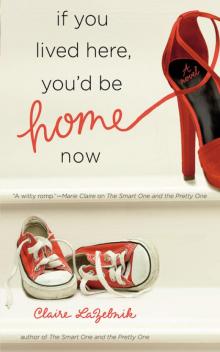 If You Lived Here, You'd Be Home Now
If You Lived Here, You'd Be Home Now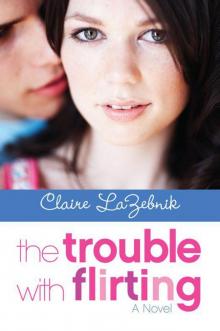 The Trouble With Flirting
The Trouble With Flirting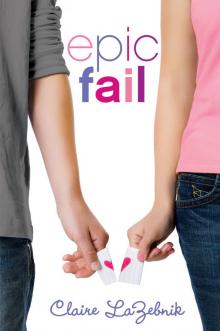 Epic Fail
Epic Fail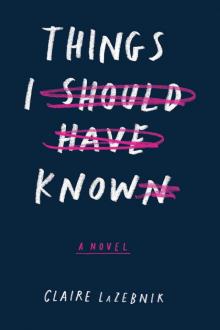 Things I Should Have Known
Things I Should Have Known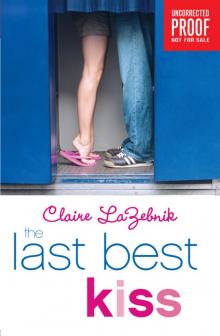 The Last Best Kiss
The Last Best Kiss Families and Other Nonreturnable Gifts
Families and Other Nonreturnable Gifts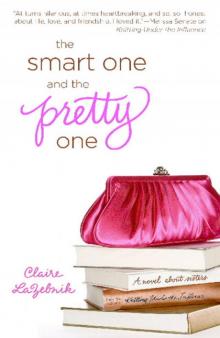 The Smart One and the Pretty One
The Smart One and the Pretty One